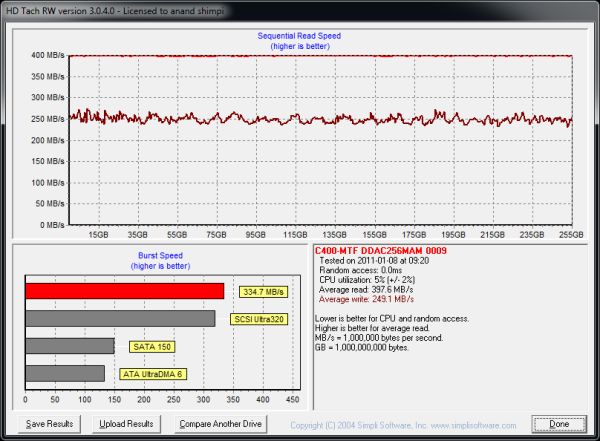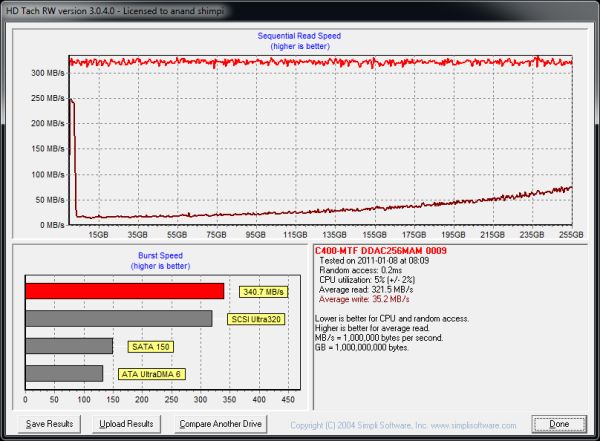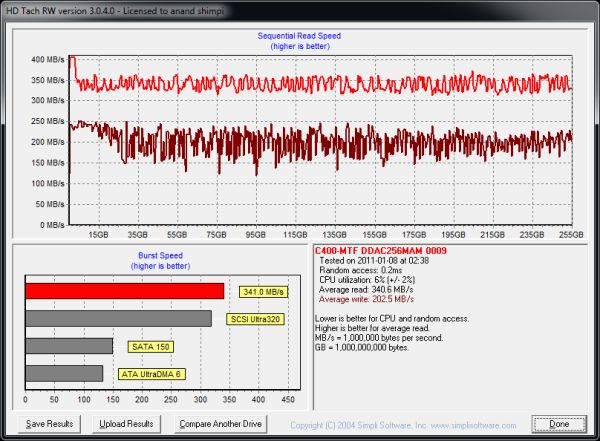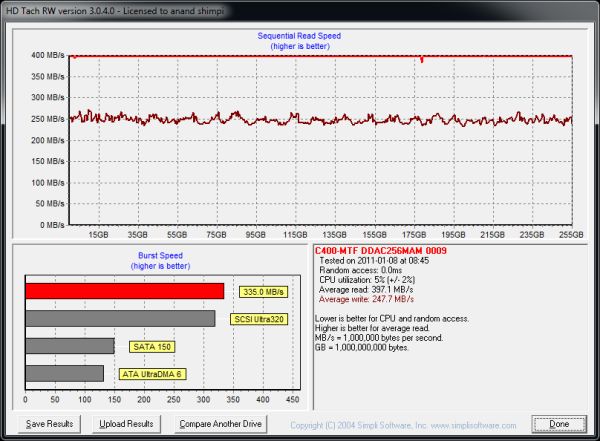The Crucial m4 SSD Update: Faster with FW0009
by Anand Lal Shimpi on August 31, 2011 12:56 AM ESTTesting TRIM
SSDs by default have no knowledge of what locations in NAND contain valid or invalid data. All writes are committed to NAND and it's not until an LBA is overwritten that the controller gets rid of the data previously at that address. Well designed controllers thrive with as much free space as possible, but without knowing what NAND blocks contain valid data the amount of free space on a drive from the controller's perspective diminishes over time. This results in the oh-so-familiar performance degradation over time that plagues all SSDs. The ATA TRIM command was introduced to help alleviate this issue. In a supported OS with TRIM enabled drivers, whenever data is deleted a command is sent to the SSD to TRIM the LBAs that map to the now invalid data. Upon receiving this command, modern SSDs mark those NAND blocks as invalid and schedule them for recycling. In the end this helps performance remain high over time.
Note that TRIM doesn't solve all fragmentation - you need a good controller with well architected firmware to ensure that fragmentation doesn't become an out of control problem. To understand how the m4's TRIM implementation performs let's first look at its fresh, out-of-box sequential write speed:
Note the relatively consistent write performance averaging 250MB/s. Now let's put the drive in a horribly fragmented state by first writing to all user addressable LBAs sequentially then performing a 4KB random write test at a queue depth of 32 across the entire drive for 20 minutes. This is what a sequential pass looks like after our little torture session:
Note the remarkable falloff in performance. Most of this is due to just how fast the m4 can write 4KB of data randomly across the drive, but it also shows that Crucial manages to reach such high 4KB random write speeds by not adequately combating fragmentation on the fly. Thankfully the drive does seem to recover pretty well, here's what it looks like after a second sequential pass:
Finally if we format the entire drive we get to see how well the m4 responds to the ATA TRIM command. To avoid giving the m4 an easier time I secure erased the drive, re-ran our torture test without the second pass (above) and then TRIMed its contents to produce the graph below:
Performance is back to new. What does all of this tell us? If you're running an OS with TRIM support you'll likely be just fine with the m4. Pseudo-random writes are common within any desktop workload, but if you avoid filling your drive to capacity and have a TRIM supported OS the drive shouldn't get into a bad state. The bigger concern is running the m4 in an OS without official TRIM support (e.g. Mac OS X) where you could find yourself in a particularly bad situation over a long period of time. Even then, it's obvious that sequential write passes over used LBAs cleans the drive up fairly well. Chances are that a standard desktop workload in a TRIM-free OS would be fine over the long run. If not, some sequential writes to any free space would do the trick (e.g. copying a large video file then deleting it).














45 Comments
View All Comments
ckryan - Wednesday, August 31, 2011 - link
As one of those Intel 510 owners, I wish Intel would release some differing firmware releases to enhance some aspects of drive performance (I for one would enjoy smaller read and write ability over top end speed the 510 has). It's good to see some improved performance with the M4 at any rate, and there weren't many fixes needed either. Between the Crucial C300 and m4, the Intel 510, and the Corsair P3, you can get some vastly different performance characteristics just on firmware alone.I don't regret buying the 510, but I do regret not saving some money and getting the Performance 3, a drive which recently was going for >$100 less than the 120 GB 510 on Newegg a few days ago. So all told, Micron powered drives are -mostly- the same, but there are some important differences -- mostly price. If you don't want a SandForce controlled SSD, get which ever one is cheaper.
cactusdog - Wednesday, August 31, 2011 - link
The 256GB M4 is excellent value....imaheadcase - Wednesday, August 31, 2011 - link
Picked one up from newegg.com for $330. Its a awesome drive.jdietz - Wednesday, August 31, 2011 - link
I got this same deal. $1.30 per GB is excellent. As mentioned in the conclusion, there's probably little difference between this and more expensive drives.radium69 - Wednesday, August 31, 2011 - link
What counts most for me, is that the M4 seem very reliable. And all of the bad things really are solved. I'm very tempted to buy the 256GB one. Also for what you get, it's absolutely great.With the price they are currently offering it's a very competitive product, and we all know that competition is good. :)
Also Crucial seems to have a great customer service, which is a mood point but still nice to know.
With all of the trouble about sandforce drives, Corsair force 3, OCZ vertex 2 and vertex 3, I absolutely don't want to risk any data corruption/loss. Why spend more and have a greater risk? Why all the bleeding edge products, when you can get nearly same results for a much friendlier price.
GoodRevrnd - Wednesday, August 31, 2011 - link
Yup. If the Samsung 830 turns out to be a disappointment I'll likely be picking up one of these.damianrobertjones - Wednesday, August 31, 2011 - link
"Improvement for intermittent failures in cold boot up related to some specific host systems."Intermittent? According to the forum AND my Elitebook it's EVERY single boot from off that causes the black screen of nothing'nuss.
I just love how they worded that little bit there.
Glad they've fixed the problem... or have they... 'Improvement'?
Patrick Wolf - Wednesday, August 31, 2011 - link
Recently the 128GB M4 has been $180 or less on many sites, making it the best value.Marlin1975 - Wednesday, August 31, 2011 - link
Most were $160 and buy.com was $150 with coupon for the 128gbI could not pass up a non-sandforce 128gb for $150 shipped.
raducanon - Wednesday, August 31, 2011 - link
Today 8/31/2011 at Newegg Shell Shocker Deal (between 10.00 AM - 12.59 PM PT ) the Crucial M4 SSD 128 GB will be $169.99 !!!!!!